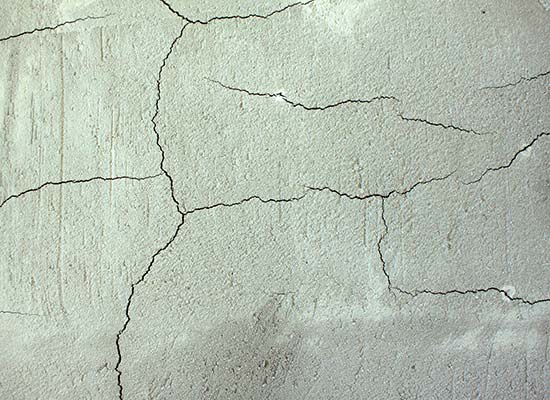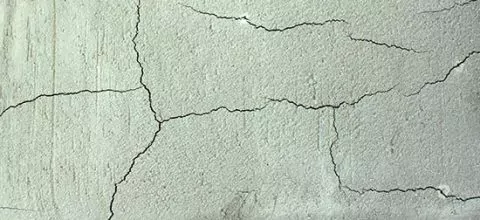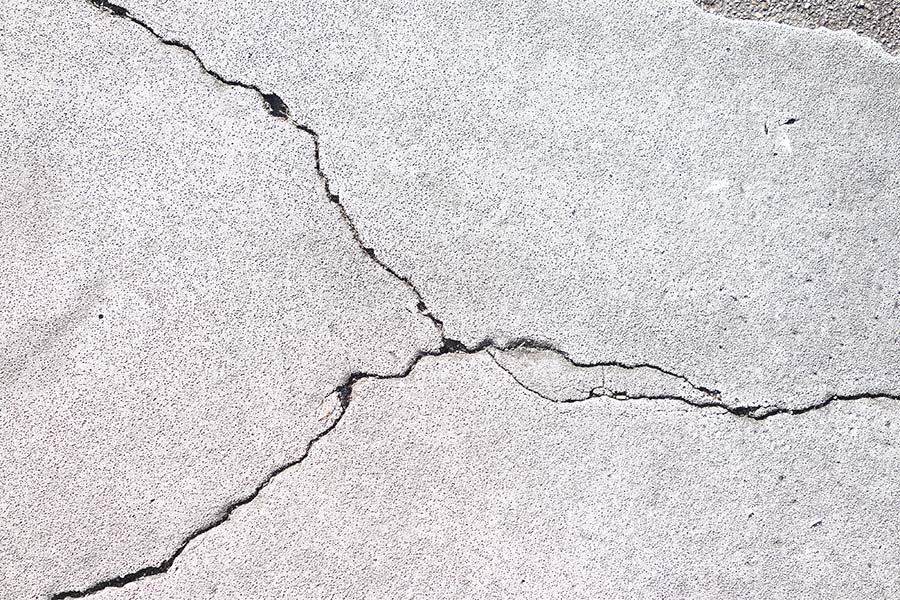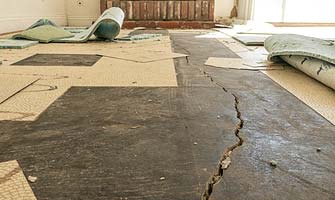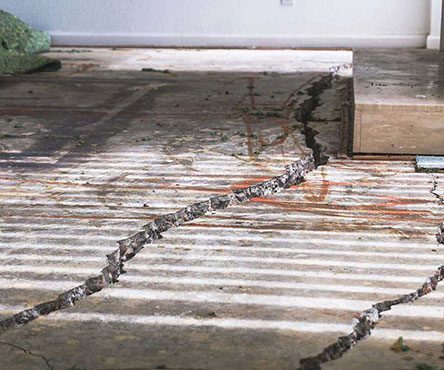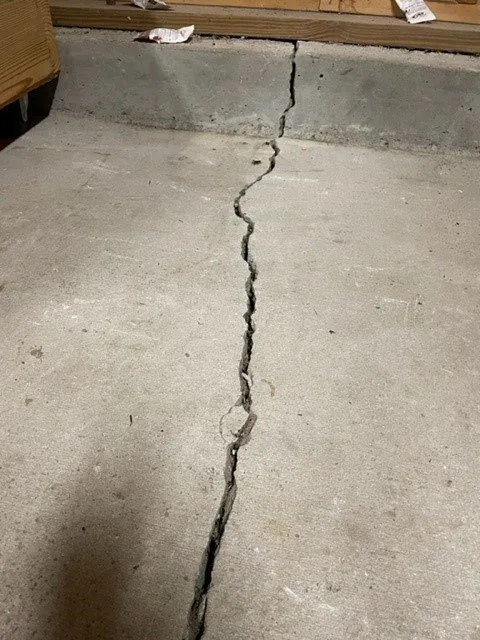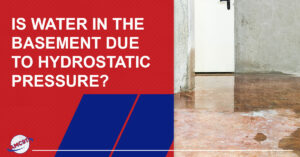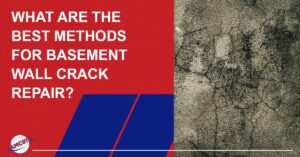Are you searching for information on how to repair large cracks in a concrete garage floor? If so, don’t hit that back button because that’s what we’ll discuss here in this article.
While cracked garage floors are pretty much a fact of life, large cracks in a concrete garage floor are not normal. If you have one of those, you have a problem. However, the good news is large cracks in your concrete garage floor can be fixed. It’s not a DIY project, though. You’re going to need a foundation repair professional for this job.
What Causes Large Cracks In a Concrete Garage Floor?
Large cracks in a concrete garage floor are not cosmetic. They are usually caused by differential foundation settlement. Differential settlement happens when the soil under a foundation is weak or unstable. This causes the foundation to settle into the ground unevenly. Differential settlement puts a lot of stress on the foundation and could result in a cracked garage floor. In other words, a large crack in a concrete garage floor means there’s a problem with the foundation’s structural integrity. This is why repairing a large crack in a concrete garage floor is not a DIY project.
Ok, so the large crack across your concrete garage floor was probably caused by differential settlement. But what caused the differential settlement? Differential settlement can be caused by various things, including:
What Causes Large Cracks In a Concrete Garage Floor?
Large cracks in a concrete garage floor are not cosmetic. They are usually caused by differential foundation settlement. Differential settlement happens when the soil under a foundation is weak or unstable. This causes the foundation to settle into the ground unevenly. Differential settlement puts a lot of stress on the foundation and could result in a cracked garage floor. In other words, a large crack in a concrete garage floor means there’s a problem with the foundation’s structural integrity. This is why repairing a large crack in a concrete garage floor is not a DIY project.
Ok, so the large crack across your concrete garage floor was probably caused by differential settlement. But what caused the differential settlement? Differential settlement can be caused by various things, including:
- The soil under the garage’s foundation wasn’t adequately compacted before the foundation was built. Soil needs to be tamped down before anything gets built on top of it. If this isn’t done, the structure will settle into the soil later, usually unevenly. This is differential settlement.
- Problems related to expansive soil. Soil with a lot of clay in it is called “expansive” because it expands when it soaks up moisture and then shrinks when it dries out. This swelling-shrinking cycle is usually seasonal and creates movement in the soil under the foundation. Over time, this could lead to differential settlement, leading to a big crack across your garage floor.
- Digging next to the foundation. If there’s heavy excavation going on next to the garage, it might have destabilized the soil under the garage’s foundation. This, in turn, destabilized the foundation and caused a crack to form in the garage floor.
- Seismic activity. We probably don’t need to explain how earthquakes can destabilize a foundation and cause a garage floor to crack.
- Weather changes. For example, if the garage’s foundation was built on top of expansive soil during the dry season, when the wet season comes around again, the soil will swell, pushing up on the slab, which could cause the floor to crack.
Cracks caused by differential settlement are structural. In other words, they affect a foundation’s structural integrity and are usually “active” in that they get bigger. They might even open and close with the seasons.
Of course, not all cracks in a garage floor are structural. Some are just cosmetic and often caused by concrete shrinkage during the concrete curing process. However, these types of cracks are usually hairline. You might not like how they look, but they’re not affecting the foundation’s structural integrity under the garage.
For more information see, Normal Foundation Cracks: Is There Such a Thing?
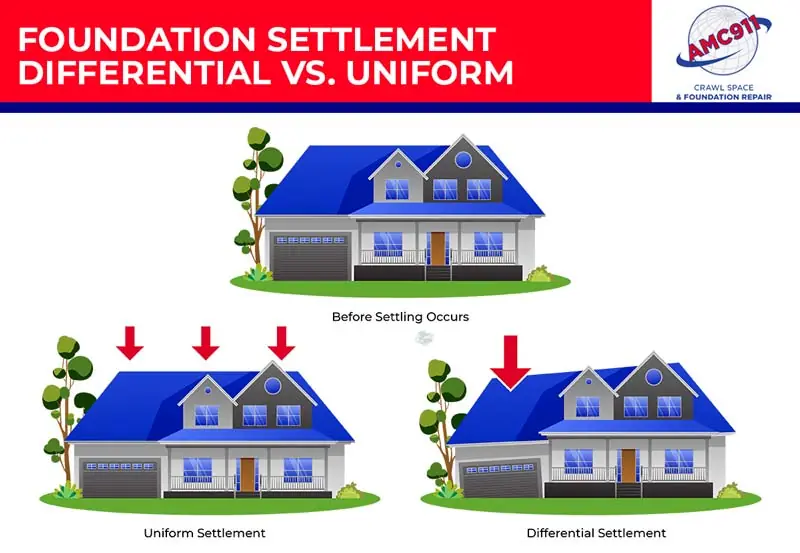
How to Repair Large Cracks in a Concrete Garage Floor
At AMC911, we use carbon fiber to repair large cracks in a concrete garage floor. Carbon fiber is a flexible but extremely strong material that’s used in the construction of commercial aircraft. Carbon fiber will stabilize a large crack in a concrete garage floor and keep it from getting any bigger. If the foundation under the garage is heavy enough, we could also use slab piers in conjunction with polyfoam.
Is Fixing Large Cracks a DIY project?
A large crack is always structural, so you’ll need to call a foundation repair professional. If that is a non-structural crack, cosmetic crack, you could probably fix it yourself.
How To Prevent Large Garage Floor Cracks
The best way to prevent large cracks in your concrete garage floor is to prevent differential settlement, and the best way to prevent differential settlement is to control groundwater around your foundation.
Why is controlling groundwater so important? It’s important because, believe it or not, most foundation problems – including differential settlement – are caused by water. When there’s too much or too little of it in the soil around a foundation, you will eventually have trouble. Fortunately, controlling groundwater around a foundation isn’t that hard. Here are a few things you can do:
- Make sure your yard slopes away from the foundation – A yard that slopes toward the foundation will cause water to drain toward the foundation. If you suspect your yard isn’t sloped away from the garage’s foundation enough, you can either fix this yourself or ask a professional landscaper for help. Sometimes foundation repair contractors will help with this, but not always.
- Make sure your gutters aren’t clogged – Clean your gutters regularly because gutters clogged with leaves and debris will cause water to spill over the side of the garage and soak into the ground around the foundation.
- Install downspout extensions, if necessary – Short downspouts will dump water close to the foundation, where it will sink into the soil. Downspout extensions are inexpensive, easy to install, and will carry water away from the foundation before releasing it.
- Keep flowers, shrubs, trees, and other vegetation away from the garage – You don’t want an excuse to pour more water into the soil around the garage’s foundation.
- Install a French drain in your yard – French drains are shallow, gravel-lined trenches. They’re great for channeling excess water away from foundations.
Check out our complete guide to – foundation cracks
If you have a large crack in your garage floor and you’re in our service area – Hampton Roads and the surrounding areas in Virginia – contact us today, and we’ll come out for an inspection and then give you a repair estimate.

